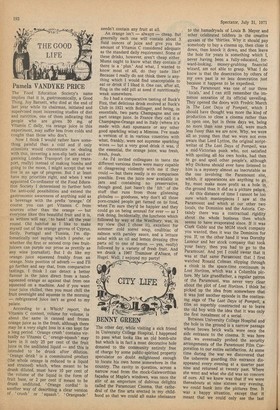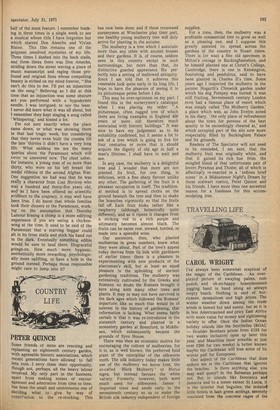CITY LIFE
BENNY GREEN
The other day, while visiting a sick friend in University College Hospital, I happened to pass what looks like an old bomb-site but which is in fact a most decorative hole donated to the community entirely free of charge by some public-spirited property speculator no doubt enlightened enough to locate his own home somewhere in the country. The cavity in question, across a narrow road from the mock-Galsworthian façades of Maple's windows, was once the site of an emporium of dubious delights called the Paramount Cinema, that cathedral of the fine arts erected in my childhood so that we could all make obeisance to the hamadryads of Louis B. Meyer and other celebrated tiddlers in the creative stream of the 'thirties. Why it should pay somebody to buy a cinema up, then close it down, then knock it down, and then leave the hole for years is something which I, never having been a fully-educated, forward-looking, money-grubbing financial wizard, am not able to grasp. What I do know is that the desecration by others of my own past is no less desecration just because it happens to be expedient.
The Paramount was one of our three 'locals,' and I can still remember the immense sensation of its official unveiling. They opened the doors with Fredric March in The Last Days of Pompeii, which I should have thought was more the kind of production to close a cinema rather than to open one, but in those days we, being no more than nine years old, were much less fussy than we are now. Why, we were all so young then that we were not even aware that Lord Lytton, the original scriptwriter of The Last Days of Pompeii, was a mid-Victorian punk who, not satisfied with spoiling all his own books, had then to go and spoil other people's, although why Dickens should ever have listened to him is a mystery almost as inscrutable as the one involving the Paramount site, which, if appearances are anything to go by, must make more profit as a hole in the ground than it did as a picture palace, At this distance of time I cannot be too sure which masterpieces I saw at the Paramount and which at our other two locals, the Dominion and the Astoria. Certainly there was a contractual rigidity about the whole business then which seems to have evaporated since. If it was Clark Gable and the MGM stock company you wanted, then it was the Dominion for you. If, on the other hand it was Dorothy Lamour and her stock company that took your fancy, then you had to go to the Paramount. And yet I could swear that it was at that same Paramount that I first watched Ronald Colman slipping through a chink in the space-time continuum in Lost Horizon, which was a Columbia picture. My late grandfather, a regular patron of the Paramount, was never very clear about the plot of Lost Horizon. I think he picked up the idea from somewhere that it was just another episode in the continuing saga of The Last Days of Pompeii, a film so superbly constructed as to leave the old boy with the idea that it was only the first instalment of a serial.
Between University College Hospital and the hole in the ground is a narrow passage whose brown brick walls were once the side entrance to the cinema. It was here that we eventually probed the security arrangements of the Paramount Film Corporation to our entire satisfaction. At some time during the war we discovered that the usherette guarding this entrance disappeared every evening at a quarter past nine and returned at twenty past. Where she went and what she did was no concern of ours. All we knew was that if we were thereabouts at nine sixteen any evening, we could bunk into the pictures free. It was a happy situation, except that it meant that we could only see the last half of the main feature, I remember bunking in three times in a single week to see a musical whose title I have forgotten but which starred Don Ameche and Vivian Blaine. This film remains one of the poignant unsolved mysteries of my life. Three times I dashed into the back stalls, and three times there was Don Ameche, striding down the street waving a piece of music manuscript and raging those profound and original lines whose compelling beauty is etched on my mind forever, "She can't do this to me. I'll put an injunction on the song." Believing as I did at this time that an injunction was some obscure act you performed with a hypodermic needle, I was intrigued, to say the lease I never did learn what it was all about, but I remember they kept singing a song called 'Whispering,' and kissed a lot.
I'm not sure exactly when the place came down, or what was showing there in that last tragic week, but considering that they never even built the cinema till the late 'thirties it didn't have a very long life. What saddens me are the many queries about the Paramount which will never be answered now. The chief usher, for instance, a young man of no more than thirty, who wore on his left breast the medal ribbons of the second Afghan War. One suggestion we had was that he was really a character from Lost Horizotz who was a hundred and thirty-five years old, and as I have been offered no scientific evidence to the contrary, it may well have been true. I do know that whole families took their dinners to the Paramount, working on the assumption that Dorothy Lamour kissing a chimp is a more edifying experience if you are eating a chickenwing at the time. It used to be said of the Paramount that a starving beggar could Sit in its front stalls and stick his hand out in the dark. Eventually something edible would be sure to land there. Disgraceful goings-on. How much more hygienic, aesthetically more rewarding, psychologically more uplifting, to have a hole in the ground instead. Perhaps those responsible might care to jump into it?











































 Previous page
Previous page